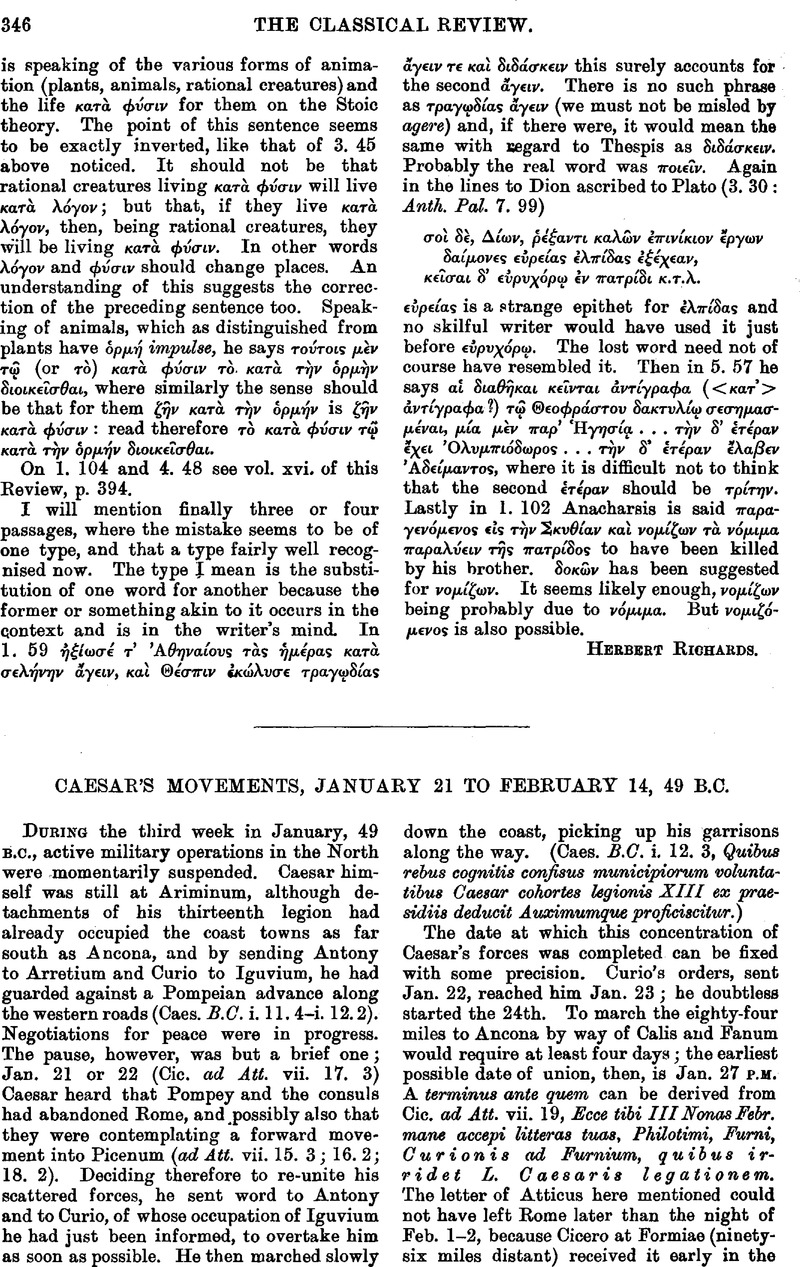No CrossRef data available.
Article contents
Caesar's Movements, January 21 to February 14, 49 B.C.
Published online by Cambridge University Press: 27 October 2009
Abstract

- Type
- Original Contributions
- Information
- Copyright
- Copyright © The Classical Association 1904
References
page 347 note 1 The objection may be raised that Curio, because he knows Caesar's intention to reject all proposals of peace, is laughing at the embassy, without having heard its terms or Caesar's reply to them. The following considerations, however, make that supposition extremely improbable.
(1) For two or three days before Feb. 3 (the date of ad Att. vii. 19), speculations about Caesar's answer to the envoys were uppermost in Cicero's mind; see ad Att. vii. 16. 2; 17; 18. 1–3. From the first four lines of vii. 19 we see that he has now received information which he regards as decisive; the embassy is dismissed from his thoughts, not to be mentioned again, and he starts at once for Capua to ascertain Pompey's plans (vii. 19, last sentence; cf. vii. 16. 2). Is it then likely that, in the hasty note in which he acknowledges the packet from Atticus, Cicero would single out for special mention Curio's letter, unless that were the one which brought the all-important news?
(2) It must also be remembered that, if Curio, when he wrote to Furnius, had not rejoined the army, he had not seen Caesar since about Jan. 15, and presumably had received no word from him of date later than Jan. 22; he was not present at the conference with L. Caesar on the 18th or 19th and knew of no negotiations later than those. What then could have called forth his jests at this particular time? Besides, even assuming that Caesar was not, in point of fact, desirous of peace, he at any rate was endeavouring to seem so. Hence one of his trusted officers, when writing to a man who was in communication with prominent Pompeians, would scarcely venture any remarks tending to discredit Caesar's sincerity in his concessions of Jan. 18. But, after Curio had learned of Pompey's final reply, it would be in place for him to express Caesar's and his own dissatisfaction with that reply.
page 347 note 2 With this later date (Feb. 3) for Antony's arrival, it is somewhat less difficult to understand why, as long afterwards as Feb. 16, Pompey (in ad Att. viii. 12c. 1) quotes a message which he has received about the concentration of Caesar's troops. See Schmidt, Briefwechsel, pp. 130–1. This move, however, was not unknown to Pompey before Feb. 16; he distinctly says in viii. 12c. 1 that he has learned the same facts from more than one source. Ad Att. viii. 12B. 2 shows that he had heard of Caesar's plan at least as early as Feb. 11 or 12.
page 348 note 1 If Vibullius had come on Feb. 7, the departure could have been set for the 8th instead of the 9th. Domitius would have had ample time for preparation after the arrival of Lentulus and Thermus on Feb. 5. (See ad Att. vii. 23. 1 and Schmidt's comment, p. 131 f.)


